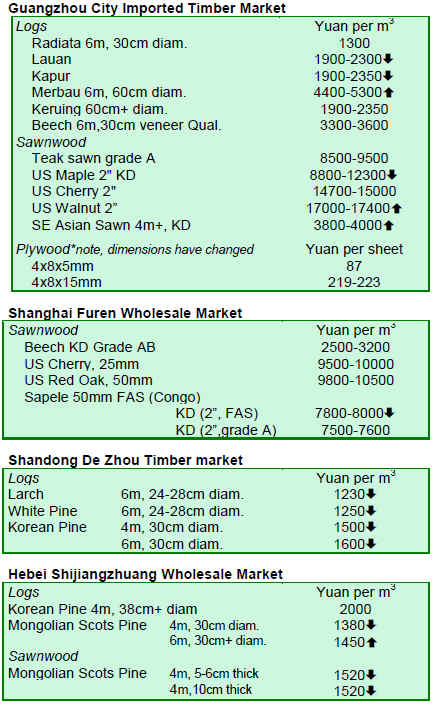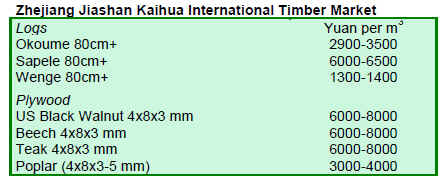US Dollar Exchange Rates of 15th Jan. 2009
China Yuan 6.8365
Report from China
Financial downturn brings losses for China¡¯s forest
products trade
Due to the impact of the global financial crisis, the total
import and export value of China¡¯s forest products trade
fell in 2008, with prices of secondary processed wood
products dropping by 20 to 25%. To date, almost 50% of
plywood enterprises have stopped or partially stopped
production, and about 20% of wood flooring enterprises
are also in difficult positions financially. Export-oriented
product enterprises have been hurt more severely than
enterprises catering to the domestic market.
According to Mr. Zhang Jianlong, Vice Administrator of
the State Forestry Administration, China¡¯s forestry sector
has grown substantially since it adopted a series of reforms
and expanded its forest policies. The total output of
China¡¯s forestry trade reached 1.2 billion yuan in 2007,
although the dismal global financial situation in late 2008
negatively impacted the Chinese forestry sector to varying
degrees. According to statistics, for the first ten months of
2008, China¡¯s wood processing industries suffered a total
approximate loss of 34 billion yuan, of which: logs,
sawnwood and chips lost 6.5 billion yuan; the wood-based
panel industry lost between 8 and 10 billion yuan; and
furniture and other wood products lost between 18 and 20
billion yuan. Forest cultivation, the forest tourism industry
and the non-wood forest products industry have also been
negatively affected to varying degrees.
In light of the recent financial crisis and the aftermath of
the natural hazards such as the heavy snows and
earthquakes in 2008, Mr. Cao Quingrao, a spokesman for
the SFA, said that SFA would take a number of measures
in response to these events. First, SFA is expected to
encourage domestic demand and promote employment,
including by investing 10.64 billion yuan in forestry,
which includes 7.71 billion yuan in direct investment and
2.92 billion yuan in tax benefits. Second, the SFA said it
would assist with the alleviation of some of the problems
faced by forest enterprises in China. Third, it will work to
stabilize wood products export rebate policies, with recent
measures being taken to subsidize enterprises by 410
million yuan. Finally, it will work to encourage and
support enterprises to increase their capacity to cope with
the financial crisis.
Growth of wood products drop in Guangdong Province
Guangdong Province is an important production center for
China¡¯s wood products, although it has recently suffered
setbacks due to the global financial crisis because of its
orientation toward the export markets. Statistics show that
during the first 10 months of 2008, imports and exports of
major wood products such as furniture and wood-based
panels experienced negative growth compared to the same
period in 2007.
In terms of imports, China imported a total of 25.46
million m³ of logs, down 19.6% from 2007, of which
imports from Russia fell 5.43 million m³ (25%). The
import of logs to Guangdong Province fell 14% during the
same period. In terms of exports, statistics show that
during the first 10 months of 2008, exports of plywood
from Guangdong Province to the US, the most significant
importing country to the province, fell 30% from the same
period of 2007. The export of wood furniture fell 5.8%
and MDF fell 45% during the same period. Due to the
financial crisis, enterprises producing and exporting wood
products continued to be in a difficult position.
Leizhou Peninsula suffers from substantial shut
downs
Zhangjiang City, located in Leizhou Peninsula of
Guangdong Province, has been an important center for
establishing eucalypt plantations. Since 2001, the wood
processing industry has developed rapidly. The number of
wood processing enterprises in the area was 143 in 2008,
up from about 30 in 2003. Most of the enterprises are
export-oriented, of small scale and labor intensive, with
employees in these enterprises amounting to nearly
20,000. Since the second half of 2008, due to the global
financial crisis, most wood processing enterprises in China
were in a difficult position. Until the present time, about
130 enterprises have shut, while others have temporarily
stopped production. For instance, the Cui Hong Company,
the largest wood processing enterprise in Zhangjiang City,
has suffered a 50 million yuan loss, since its exports have
fallen 20% and with the average unit price of plywood
decreasing by about USD30 per m³.
Trade in China¡¯s wooden doors and windows dipped in
2008
According to statistics from China¡¯s General Customs
Administration, international trade in wooden doors and
windows from China dropped during the first 10 months
of 2008. China exported a total of 34,000 tons of wooden
windows, valued at USD112 million during the period,
down 11% by volume and 3% by value from the same
period in 2007. During the same period, China imported 1
thousand tons of windows, valued at USD924,000, down
19% by volume and 12.5% by value.
Additionally, China exported a total of 258,500 tons of
wooden doors, which were valued at USD458 million
during the period, down 9% by volume and 1% by value
during the same period. China imported 377 tons of doors
valued at USD2 million, down 29% by volume and 59%
by value when compared with values from 2007.


¡¡ |